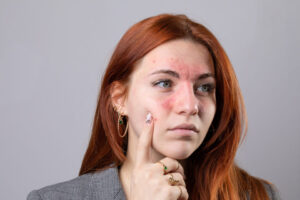Understanding Eczema

What is eczema?
If you have been diagnosed with eczema, you know that it’s a skin condition that involves itchy, skin rashes. What you may not know is that eczema is not just one skin condition. It is actually an umbrella term referring to a group of conditions with similar symptoms. Also known as dermatitis, eczema causes rashes and dry, scaly skin. The causes of eczema are not exactly known, but the condition often coincides with allergies, so experts believe they may be related.
Types of eczema
There are many different types of eczema, but the two most common are atopic eczema and contact dermatitis.
- Atopic dermatitis often coincides with hay fever and asthma. It is believed to be caused by a genetic autoimmune disorder and is common among young children, though it can occur at any age.
- Contact dermatitis happens when a person comes into contact with a certain substance. The substances, or irritants, vary between people, and include things like soaps, lotions, alcohol, detergents, dryer sheets, shampoos, and fungi.
Risk factors
The predisposition for eczema is largely genetic. Interestingly, children born outside the United States are at lower risk, but their risk goes up after living in the U.S. for 10 years or longer. People in urban areas are more likely to experience eczema because of irritants in their environment, and people in developed nations are more likely to have it than those in developing countries. It is believed that this is because cleaner living conditions, childhood vaccinations, and antibiotic use all have an impact on the immune system, making people more likely to have atopic diseases.
Complications
Because eczema causes breaks in the skin, it increases the risk of bacterial infections. This risk is higher if treatment protocols are not followed correctly, or the skin is scratched. Viral skin infections can also occur, causing cold sores. Often, people who have eczema have difficulty sleeping, and they may suffer from psychological effects and diminished self-confidence.
Prevention
The biggest step toward preventing eczema flareups is to identify and avoid triggers. Beyond that, moisturizing the skin regularly can help keep eczema at bay. Wear gloves when using cleaning products, avoid overly dry environments, wear clothing that is loose, soft, and breathable, and wash all articles of clothing before wearing them.
Treatments for eczema
There’s no treatment that works for all of the symptoms and coinciding conditions that go along with eczema, but there are a few tried and true methods for keeping it under control. Topical creams, including over the counter medications, can help control dryness, redness, itching, and other symptoms. Antihistamines can also help because they limit the body’s allergic response. If further help is needed, your dermatologist can prescribe one of the safe and effective prescription medications available to treat eczema.
When to see a doctor
If you believe you or your child have symptoms of eczema, you should seek medical attention, to make sure any treatment you are using is the right option for you. Especially if the condition is uncomfortable enough to impact sleep and daily activities, or you suspect a skin infection, it’s vital to see a medical professional for help. If the rash is accompanied by a fever, seek immediate medical care.
Eczema Treatment from the Experts
If you need a dermatologist to help with your eczema, look to Swinyer-Woseth Dermatology. Committed to providing superior, professional hair and skin care in a manner that’s practical, efficient, and compassionate, we have over 30 years of experience providing dermatological services in Salt Lake City. We provide a variety of services, from cosmetic skincare to treatment for skin cancer. Our team of board-certified dermatologists and licensed cosmetic service providers are here to provide you the care you need in a comfortable, professional atmosphere. Call (801) 682-4715 or contact us through our website.
